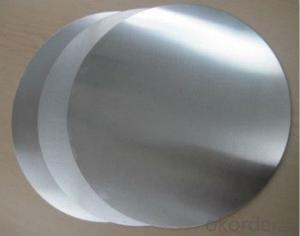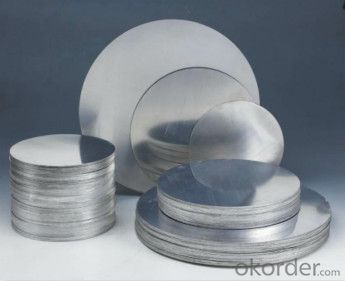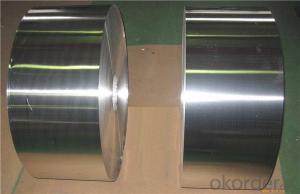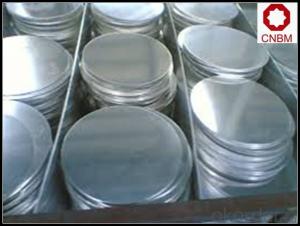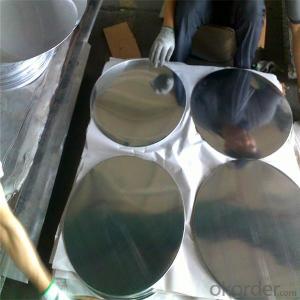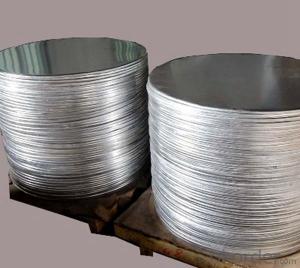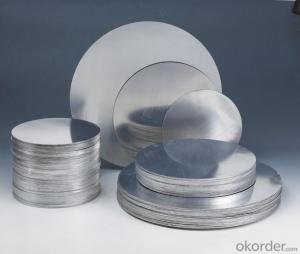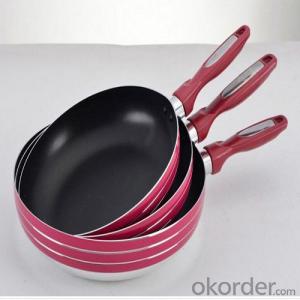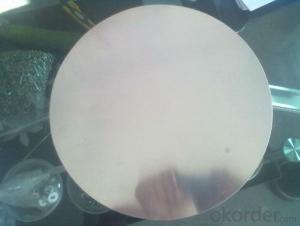Aluminum Coils Canada CC Circle for Aluminium Cookware Application
- Loading Port:
- Shanghai
- Payment Terms:
- TT OR LC
- Min Order Qty:
- 5 m.t.
- Supply Capability:
- 2000 m.t./month
OKorder Service Pledge
OKorder Financial Service
You Might Also Like
1. Structure of CC Aluminium in Coil Form for making Aluminium Circle Description
CC Aluminium in Coil Form for making Aluminium Circle is one semi-finished aluminium material. This coil can be rolled down to aluminium coil,sheet,circle ect. The alloy AA1050 is widly used in building, industry ect. Its weight is much lower than steel. So many customers choosed aluminium material instead of steel. Aluminium circle is widely used for kitchen wares including fried pans, non-sticky pans, cooking pots, hard anodize cook ware, pressure cooker and house hold utensils etc.
2. Specification of CC Aluminium in Coil Form for making Aluminium Circle
Aluminum Coil/Sheet | |
Main Specification | |
Alloy | AA1xxx (AA1050, AA1060, AA1070, AA1100 etc.) |
AA3xxx (AA3003, AA3004, AA3005, AA3105 etc.) | |
AA5xxx, AA6XXX (AA5052,AA5083, AA5754, AA6061, AA6062 etc.) | |
AA8xxx(AA8011, AA8006 etc.) | |
Temper | H14,H16, H18, H22, H24, H26, H32,O/F, T4, T6, T651 |
Thickmess | 0.01mm-100mm |
Width | 30mm-1700mm |
Standard | GB/T 3880-2006/ASTM |
Special specification is available on customer's requirement | |
3. Feature of CC Aluminium in Coil Form for making Aluminium Circle
Surfact Quality :
Be free from Oil Stain, Dent, Inclusion, Scratches, Stain, Oxide Dicoloration, Breaks, Corrosion, Roll Marks, Dirt Streaks and other defect which will interfere with use,
Mechenical Property:
Chemical Composite and Mechanical Property
4. Image of Aluminium Circle
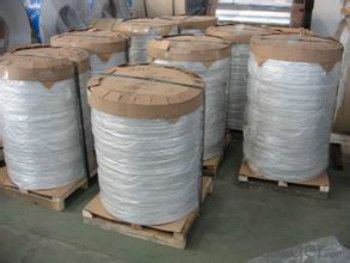
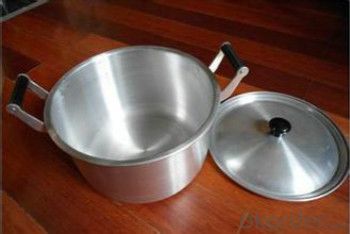
5. FAQ
1) What is the delivery time?
Depends on actual order, around 20 to 35 days
2) What is the QC system:
We have QC staff of 20 persons and advanced equipment, each production is with MTC traced from Aluminum ingot lot.
3) What market do you mainly sell to?
Australia, America, Asia, Middle East, Western Europe, Africa etc
4) Payment term?
30% T/T in advance, balance against B/L copy.
- Q: How are aluminum coils used in the production of automotive radiators?
- Aluminum coils are used in the production of automotive radiators as they provide excellent heat transfer properties. These coils are typically made from aluminum alloy, which is lightweight, corrosion-resistant, and has high thermal conductivity. The coils are formed into a specific shape and then attached to the radiator's core. As coolant flows through the coils, heat from the engine is transferred to the aluminum, which efficiently dissipates it. This helps in cooling the engine and maintaining its optimal operating temperature. Overall, aluminum coils play a crucial role in enhancing the efficiency and performance of automotive radiators.
- Q: How should aluminum coil be stored to maintain its quality and prevent damage?
- <p>The best way to store aluminum coil involves several key practices: Store the coil in a clean, dry, and well-ventilated area to prevent moisture and dirt accumulation. Ensure the storage area is free from corrosive substances and temperature fluctuations. Use pallets or racks to keep coils off the ground, and avoid stacking heavy items on top. Protect coils with plastic covers or wrapping to prevent dust and scratches. Organize coils by size, type, and grade for easy access and to prevent damage during handling. Regularly inspect stored coils for signs of damage or corrosion and rotate stock to minimize prolonged storage of any single coil.</p>
- Q: Can aluminum coils be used for seamless gutters?
- Seamless gutters can indeed utilize aluminum coils. The reason aluminum is favored for gutter systems is its ability to withstand wear, its lightweight composition, and its resistance to rust. Aluminum coils are frequently employed in the construction of seamless gutters, which boast several advantages over the more traditional sectional gutters. Custom-made on-site, seamless gutters guarantee a flawless fit for the specific measurements of a structure. This eliminates the necessity for seams, which are susceptible to leaks and require regular maintenance. Moreover, aluminum is malleable, making it easy to shape seamless gutters to accommodate a building's unique design. In summary, aluminum coils present a practical and efficient option for the creation of seamless gutters.
- Q: I would like to know because I'm getting a sword with an aluminum sheathe.
- That would depend on The Alloy and the Condition The alloy is the elements in percent that make up that material. The Condition is the heat treat of that alloy. Reffered to as Treatment when it comes to Aluminum Examples: 2024 T4 6061 T6 6063 T6 7075 T7 Etc,etc,etc,etc.................... Saying the word Aluminum is like saying the word Wood (Which One?) Aluminum can range from..what is this stuff,so soft and bends so easy To what the hell is this stuff, so dam hard stiff,and it just won't bend!! Oh,and 30 year boy........sit down.......30 years,and that is all you could come up with!!!! 30 years of drinking coffee,joking with the boss,and goofing off.You may want to sit the beer down and read up on the material you have been working with for 30 Years!!!!!
- Q: What precautions should be taken when operating a welding torch on aluminum coils to ensure safety?
- <p>When using a welding torch with aluminum coils, it's crucial to follow safety measures to prevent accidents and ensure a safe working environment. Always wear appropriate personal protective equipment (PPE), including heat-resistant gloves, safety glasses, and a welding helmet. Ensure the work area is well-ventilated to avoid inhaling fumes. Use a backdraft hood or fume extraction system to capture and remove welding fumes. Keep the work area clean and free of flammable materials. Regularly inspect the torch for any damage or wear. Use the correct type of welding rod for aluminum and ensure the gas supply is compatible with aluminum welding. Never leave a lit torch unattended and always follow the manufacturer's guidelines for safe operation.</p>
- Q: hello, i'm doing a school project on aluminium and i'm a little stumped. what elements bond well with aluminium and why? thanks alot!
- Oxygen is another and AlO I believe is the most common bonded aluminum you will find.
- Q: How are aluminum coils tested for quality and performance?
- Aluminum coils are tested for quality and performance through a series of rigorous inspection processes. These tests aim to assess the mechanical, chemical, and physical properties of the coils to ensure they meet the required standards. One common test conducted is the visual inspection, where trained technicians examine the surface of the aluminum coils for any visible defects such as scratches, dents, or irregularities in shape. This step is crucial as it helps identify any cosmetic flaws that may affect the overall performance and quality of the coils. Another important test is the dimensional inspection, which involves measuring the thickness, width, and length of the coils to ensure they meet the specified tolerances. This test is critical as it helps guarantee the coils will fit properly in their intended applications and perform optimally. To assess the mechanical properties, various mechanical tests are conducted. One such test is the tensile strength test, which measures the maximum amount of stress a coil can withstand before breaking. This test helps determine the strength and durability of the coils under different operating conditions. Additionally, the hardness test is performed to evaluate the resistance of the coils to indentation or scratching. This test provides insights into the coil's ability to withstand wear and tear, ensuring its longevity. Chemical analysis is another vital aspect of quality testing. The chemical composition of the aluminum coils is examined to ensure it meets the required standards and does not contain any impurities or elements that may compromise the performance or safety of the coils. Furthermore, to assess the thermal properties of the coils, thermal conductivity tests are conducted. These tests measure the coil's ability to conduct heat efficiently, ensuring that it can effectively dissipate heat in applications where it is used. In addition to these tests, other performance evaluations may be conducted depending on the specific application of the aluminum coils. This could include corrosion resistance tests, fatigue tests, or even electrical conductivity tests. These evaluations help determine the coil's ability to perform under different conditions and ensure its reliability and longevity. By subjecting aluminum coils to these comprehensive quality and performance tests, manufacturers can ensure that only the highest quality coils are delivered to customers, meeting their expectations and standards.
- Q: Why does the end face of aluminum coil have grease spots?
- Process one without coolant to see whether there are spots. There is a layer of alumina membrane on the blank face of aluminum coil, which will react with basic coolant when heating through processing.
- Q: Explain how the temperature affects aluminum coil properties and behavior.
- <p>The relationship between aluminum coil and temperature is significant as temperature influences the coil's physical properties and performance. At lower temperatures, aluminum coils become more brittle and susceptible to cracking or breaking. As the temperature increases, aluminum's ductility improves, allowing it to be more easily shaped and formed. However, excessive heat can also lead to deformation and loss of strength. The thermal conductivity of aluminum is high, meaning it conducts heat well, which is useful in applications requiring heat transfer. Additionally, the electrical conductivity of aluminum is affected by temperature; as temperature rises, resistance increases, which can impact applications where electrical conductivity is critical.</p>
- Q: How are aluminum coils stored and transported?
- To ensure the safety and minimize damage of aluminum coils, they are stored and transported in a manner that prioritizes their well-being. Generally, these coils find their place in a warehouse or storage facility, where they are shielded from external elements and potential hazards. They are neatly stacked, taking into account security, and are safeguarded against movement or potential harm by proper padding or spacers. When it comes to transportation, aluminum coils are typically carried in flatbed trucks or shipping containers. These vehicles are equipped with secure tie-downs and restraints that prevent any shifting or damage during transit. It is crucial to ensure the proper securing of the coils to avoid any accidents or mishaps. Moreover, additional precautions are taken during transportation to protect the aluminum coils from potential harm. For instance, the coils may be shielded with protective materials like plastic or fabric, which prevent scratches or dents. In some cases, stretch film or bands may be used to provide extra protection by wrapping or strapping the coils. In summary, the storage and transportation of aluminum coils necessitate careful handling and adherence to safety protocols. This guarantees that the coils maintain their optimal condition and reach their destination without any complications.
Send your message to us
Aluminum Coils Canada CC Circle for Aluminium Cookware Application
- Loading Port:
- Shanghai
- Payment Terms:
- TT OR LC
- Min Order Qty:
- 5 m.t.
- Supply Capability:
- 2000 m.t./month
OKorder Service Pledge
OKorder Financial Service
Similar products
Hot products
Hot Searches
Related keywords
